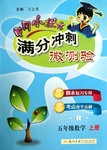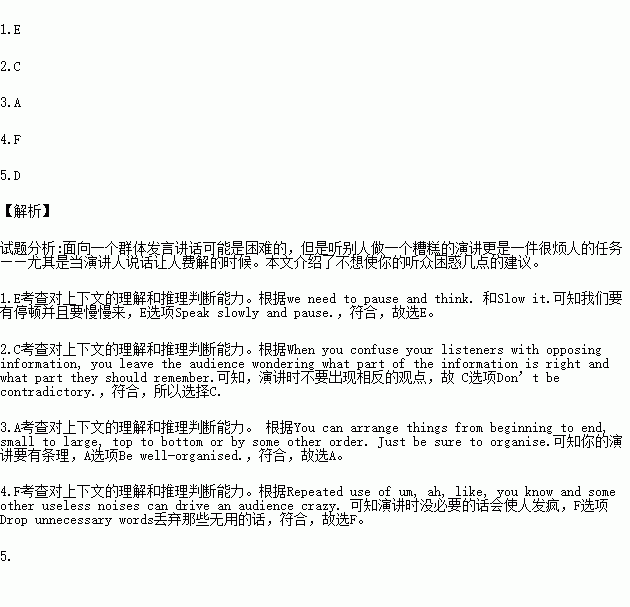题目内容
根据短文内容,从下框的A~F选项中选出能概括每一段主题的最佳选项,并在答题卡上将该选项涂黑。选项中有一项为多余项。
A. Be well-organised. B. Close with a Q & A. C. Don’t be contradictory. D. Bring it to a specific end. E. Speak slowly and pause. F. Drop unnecessary words |
Speaking to a group can be difficult, but listening to a bad speech is truly a tiresome task—especially when the speaker is confusing. Don’t want to confuse your audience? Follow these suggestions:
1. ______
When it comes to understanding new information, the human brain needs a little time. First, we hear the words; then, we compare the new information to what we already know. If the two are different, we need to pause and think. But a breathless speaker never stops to let us think about what he or she is saying and risks confusing us. Slow it.
2. ______
Sometimes we all start a sentence one way and then switch directions, which is very difficult to follow. When you confuse your listeners with opposing information, you leave the audience wondering what part of the information is right and what part they should remember. Instead of relying and keeping correcting yourself, work to get the facts clear and straight.
3.______
Jumping from point to point as it comes to your mind puts the onus (责任)on your listeners to make up for your lack of organisation. And it’s confusing for them to listen, reorganise, and figure out what you’re saying all at once. But going smoothly from one point to the next helps them understand information more easily. You can arrange things from beginning to end, small to large, top to bottom or by some other order. Just be sure to organise.
4.______
Repeated use of um, ah, like, you know and some other useless noises can drive an audience crazy. It makes the speaker sound uncertain and unprepared, and it can leave listeners so annoyed that they can’t pay attention. Recently I attended a speech that was marked by so many ums that audience members were rolling their eyes. Was anybody grasping the intended message? Um, probably not.
5.______
Many speakers finish up their speeches with question-and-answer (Q & A) sessions, but some let the Q & A go on without a clear end. The audience is often left confused about whether the meeting is over and when they can get up and leave. Do your listeners a favour by setting a time limit on questions, and close your speech with a specific signal—even if it’s something simple like, “If you have any more questions, you know where to reach me.” Or even more to the point, conclude your speech with “Thanks for your time. ”
 长江作业本同步练习册系列答案
长江作业本同步练习册系列答案 小天才课时作业系列答案
小天才课时作业系列答案 一课四练系列答案
一课四练系列答案 黄冈小状元满分冲刺微测验系列答案
黄冈小状元满分冲刺微测验系列答案
